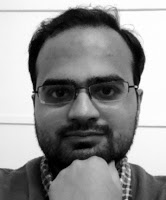I am Navneet Vasistha and This is How I Work
 Today, in the “How I Work” series, I am interviewing Navneet Vasistha. Navneet received his undergraduate and postgraduate degrees from the University of Delhi. He then moved to Oxford for doctoral studies with Prof. Zoltán Molnár. He is now a joint postdoctoral researcher in the laboratory of Prof. Siddharthan Chandran where he studies model neurodevelopment disorders using human stem cells. When not in the laboratory, he enjoys theatre, photography, writing, travelling and cooking.
Today, in the “How I Work” series, I am interviewing Navneet Vasistha. Navneet received his undergraduate and postgraduate degrees from the University of Delhi. He then moved to Oxford for doctoral studies with Prof. Zoltán Molnár. He is now a joint postdoctoral researcher in the laboratory of Prof. Siddharthan Chandran where he studies model neurodevelopment disorders using human stem cells. When not in the laboratory, he enjoys theatre, photography, writing, travelling and cooking.
Current Job: Postdoctoral Research Fellow
Current Location: Edinburgh, Scotland, UK
Current Mobile Device: Google Nexus 5
Current Computer: Apple Macbook Pro 13”
Can you briefly explain your current situation and research to us?
I am researching the effects of genetic mutations on the development and function of oligodendrocytes in psychiatric illness. The idea is to find patient relevant phenotypes (dysfunctions at the cellular or molecular level) and to then screen for compounds that might reverse these and benefit patients. For this, we use stem cell derived cellular populations.
I have been at the position for almost 2 years now. I joined the Centre for Regenerative Medicine right after my D.Phil.
What tools, apps and software are essential to your workflow?
I usually restrict myself to basic apps but am open to experimenting with anything that would boost productivity.
I am currently using the following: MS Office for Mac, Adobe Photoshop and Illustrator, GraphPad statistical software, Evernote app (synced with Android), iMail (for email client).
What does your workspace setup look like?
I have a fixed workplace at the University lab that comprises of a lab bench (for experiments since containment facilities are needed) and a desk space.
I do not work from home.
What is your best advice for productive academic work?
My advise would consist of the following:
1. Prioritise experiments, writing, submissions according to deadlines.
2. Plan your work a week (at least) in advance and stick to it.
3. Arrange results, references etc. in a easy to refer way by either using a good reference management software (e.g. Papers 3.0) or by putting relevant items in a folder from the inception of the study/project.
How do you keep an overview of projects and tasks?
I do this two ways basically.
1. Mentally: I find this to challenge my memory skills though I often find it to be wanting.
2. By writing notes on post-its and also backing them on note taking apps (such as Evernote).
Besides phone and computer, do you use other technological tools in work and daily life?
Not really. I mostly carry my music on my phone or have it synced to my computer.
Which skill makes you stand out as an academic?
I feel it is a grasp of the field whether it is via reading the works of others or understanding the theoretical basis of the work.
Also a critical analysis of your own work at each step is important.
Finally, it is the execution by means of performing experiments and analysis or in terms of writing and presenting work in journals or conferences.
What do you listen to when you work?
Various things. Flips between Hindustani music, Bollywood songs to Alternative Rock or Western Classical compositions. I don’t have a set list and depends on my mood and whether I want a lift-me mood or a calm atmosphere.
What are you currently reading? How do you find time for reading?
I recently finished a book called “The Way Things Were” by Aatish Taseer. I usually read at night before bed or over the weekend.
However, I read a lot many things on the internet (articles, stories, news)
Are you more of an introvert or extrovert? How does this influence your working habits?
I consider myself an introvert. It does influence my work habit as I end up being more self-dependent and look to evade conflict at the work place.
What’s your sleep routine like?
Usually 7-8 hours. 11pm-7am
What’s your work routine like?
Usually 10-12 hours. 8am- 7pm
What’s the best advice you ever received?
My D.Phil supervisor once told me: “We always see people who’ve published (academically) work very similar to what we are working on and feel let defeated that someone has already got to where we planned to be. But the other way to look at it is that we were always on the right track”
